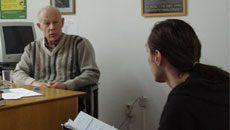 With an enviable list of journal entries, books and reviews to his name, Robert Dankoff, Professor of Turkish and Islamic Studies Emeritus at the University of Chicago, has proven to be a premier specialist in Ottoman literature. Currently, he is a guest lecturer at Bilkent University where Bilkent News had a chance to talk to him. With an enviable list of journal entries, books and reviews to his name, Robert Dankoff, Professor of Turkish and Islamic Studies Emeritus at the University of Chicago, has proven to be a premier specialist in Ottoman literature. Currently, he is a guest lecturer at Bilkent University where Bilkent News had a chance to talk to him.
When did your special interest in Ottoman literature begin? What were the main difficulties you faced in transcribing early Turkish texts?
I wanted to go to university, in 1966, after two years in the Peace Corps (in Turkey), and study Turkology at Harvard University. When I was in Turkey I fell in love with Turkish and I especially liked the Ottoman poems. I remember hearing that line of Fuzuli: "Beni cândan usandırdı cefâdan yâr usanmaz mı?" I just thought it was wonderful - the sounds of it, the language, the sentences. I thought it was such a beautiful poem, so I wanted to study Ottoman literature. When I got to Harvard, my mentor, my guide said you should study Early Turkish Islamic works. First, I worked on Divan-ı Lugat-it Türk and Kutadgu Bilig. As a result I translated both books into English at the beginning of 1980's.
When I began looking at the manuscripts, there were many philological and linguistic problems. Would they be the authors own autographed manuscript, were they copies? Also, the trouble with the manuscripts is that they are incomplete, there are numerous missing passages, they don't have pointings and so forth. And then, there were problems with the language because these strange words kept coming up that I couldn't find in any dictionary.
I wanted to focus on a part of Seyahatname of Evliya Çelebi. And I focused on the part about Bitlis. In this part of Seyahatname, there is an episode on acrobats. It is very amusing. There is also a character called Melek Ahmed Paşa being very important for this part. Then I realized that I had to focus on both earlier and later parts in Seyahatname and read the entire book. In the mid 1980's I started to read manuscripts of Seyahatname. I compiled all foreign and unknown words. After I researched the origins of those words, the book An Evliya Çelebi Glossary came out. Another project was to collect the documents about Melek Ahmed Paşa, and so, The Intimate Life of An Ottoman Statesman: Melek Ahmed Pasha was published.
You served in the US Peace Corps in the '60's. What was it like to experience such a period for you as an academician?
Of course, I wasn't an academic then, I was a law college graduate. I didn't have ambitions to become an academic. Basically, in 1964, I didn't want to go into the army and be sent to Vietnam. As an American that was a consideration. So right then and there I joined the Peace Corps and they sent me to Turkey. So, it's kind of by chance that I came, but after I came here I liked it. I liked the people, I liked the food, I liked the language. Then I started to study to become an academic.
What do you like to do outside of the classroom; here at Bilkent or in Ankara, in general?
I go to museums. I went to Vakıflar Museum and I recommend it. I also went to Etnografya Museum. And in Bilkent, I attended a musical program the day before yesterday (3rd of May) in Adnan Saygun Concert Hall. Başar Can Kıvrak, a young and very talented pianist, performed Rachmaninov's Third Piano Concerto and it was excellent. He played wonderfully well.
Thank you very much.
Naim Atabağsoy (EDEB/Graduate Student)

|







